

Pinterest, Tumblr and the Trouble With ‘Curation’ I’m not a big Pinterest user (more of a lurker, really), but the over-the-top monetary valuation doesn’t entirely surprise me.
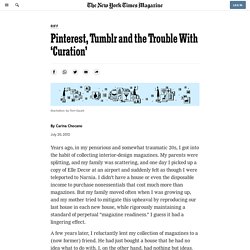
Long before I heard of Pinterest, I was already spending too much time on “curated” (read: reblogged) design/fashion/image/inspiration blogs. For me, it’s sites like Apartment Therapy, Ffffound, Poppytalk, Oh Joy and dozens and dozens of obscure, exquisite, utterly pointless but oddly compelling Tumblrs. (Some, like the addictive street-fashion blog The Sartorialist, are made up of original photos, but this is more the exception than the rule.)
In fact, in the past half-decade, I’ve probably spent more time fighting the urge to satiate my visual addictions — addictions formed in the process of satiating them, no doubt — than I have actually browsing through magazines. Not because I don’t like magazines. I used to think this obsession was mine alone. There’s a German word for it, of course: Sehnsucht, which translates as “addictive yearning.” Curation: Beyond the Buzzword - Additional Resources. On May 11th, I had the privilege of leading a session for the Council for Learning and Leadership Development of the Conference Board of Canada titled Curation: Beyond the Buzzword.
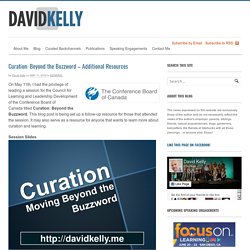
This blog post is being set up a follow-up resource for those that attended the session. It may also serve as a resource for anyone that wants to learn more about curation and learning. Session Slides My Curation-themed WritingIs Content Curation in Your Skill Set? It Should Be.Selecting a Digital Curation ToolFiltering: A Challenge and Responsibility for Learning ProfessionalsCuration: A Core Competency for Learning ProfessionalsComputers, Learning Professionals, and their Roles in CurationReflections on #clouduc8 – CurationReflections on #lrnchat: CurationReflections on #lrnchat: Content CurationCurating to Enhance Organizational Learning (T&D Magazine) Additional ResourcesSo Where is the Collaboration In Your Content Curation? Creation and Curation: Luke Davis at TEDxTelfairStreet.
What is Digital Curation? Curation. Learning is the process of acquiring knowledge, which is an active process and operates at both individual and social levels.
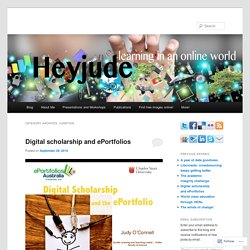
When it comes to information behaviour within this context there are a wide range of theories and models which represent thinking and research investigations in this field. Existing models have elements in common, though most models in library and information science focus on information seeking and the information user, while those from the field of communications focus on the communicator and the communication process. It is certainly worth stopping and revisiting these models, to better understand the ‘cognitive actors’ or other influences at play (Robsons & Robinson, 2013) What I’m particularly interested in are the Information seeking behaviours and places of information seeking which are constantly changing, and of course growing in possibilities all the time.
Why Curation Revolutionizes Education & Learning — Content Curation Official Guide. Why Curation Revolutionizes Education & Learning 10 Disruptive Factors Transforming the World of Education and Learning — Consequences, Opportunities, Tools “It is the best of times.
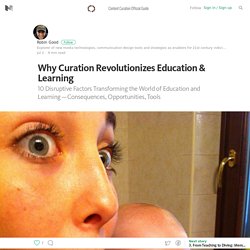
It is the worst of times. In 2020, people have access to a breadth and depth of knowledge unimaginable in an earlier age. However, schools as you know them have ceased to exist. Academia’s fortunes have waned. Why?” The world of education is being deeply and rapidly transformed much more than the majority of people presently realize. From the opportunity to easily find an appropriate learning path among the ocean of free online top university courses, to the ability to bring together valuable content from different authors into custom textbooks, from learning by diving into the subject matter at hand to curating existing educational materials into a new course, the whole spectrum of activities and interests surrounding the educational world is being rapidly transformed. Content curation. Content curation is the process of selecting, sorting and arranging content on a specific topic or theme, adding value and meaning to what has been curated for your users.
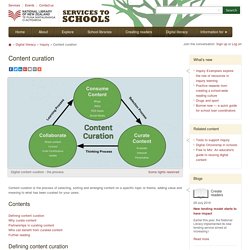
Contents Defining content curationWhy curate contentPartnerships in curating contentWho can benefit from curated contentFurther reading Defining content curation Beth Kanter defines content curation as “…the process of sorting through the vast amounts of content on the web and presenting it in a meaningful and organized way around a specific theme. The work involves sifting, sorting, arranging, and publishing information.” The curator adds value and insights to the selected content. Strong curation…also involves making decisions about what is and is not useful to deepening understanding of the subject. Curation as a tool for teaching and learning (with images) · hbailie.
“A curator is an expert learner.
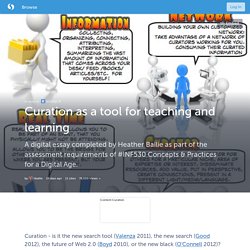
Instead of dispensing knowledge, he creates spaces in which knowledge can be created, explored, and connected.” (Siemens, 2007). According to Boyd (2010) curators help people to focus their attention on the most relevant and important information streams. Valenza (2011) tells us to take advantage of the work of others passionate about a topic and use their curated work as a search tool. Fiorelli (2011) describes content curators as “critical knowledge brokers”. Why is Digital Curation so Important for Educators in 2018? Image Source I’ve been working with schools, colleges and universities for nearly 8 years.
Working to promote entrepreneurship and digital skills to make young people more employable and teach them how to innovate. Digital research is becoming increasingly important and educators and students need to know how to curate it. The internet represents a fundamental shift in how educators and students learn and engage their coursework, gather information, and conduct academic research. We need to know how to do online research.